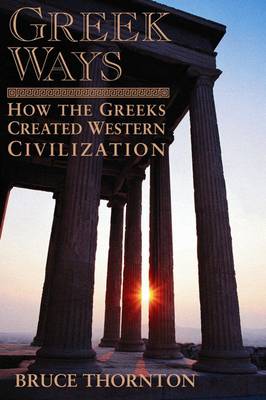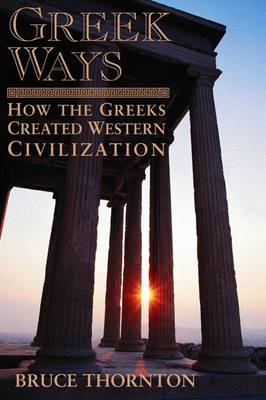
- Afhalen na 1 uur in een winkel met voorraad
- Gratis thuislevering in België vanaf € 30
- Ruim aanbod met 7 miljoen producten
- Afhalen na 1 uur in een winkel met voorraad
- Gratis thuislevering in België vanaf € 30
- Ruim aanbod met 7 miljoen producten
Zoeken
€ 23,95
+ 47 punten
Omschrijving
In the classics departments of today's universities, Bruce Thornton says, the Greeks are accused of stealing their achievements from black Egyptians, of oppressing their wives and daughters, and of hypocritically speculating about freedom while holding slaves. Most of all, classic Greek culture has come under attack precisely because its glorious achievement, extended into history, is what defines the West and makes it distinct. In Greek Ways, Thornton clears away these misconceptions. Writing with wit and erudition, he discusses in fascinating detail those areas of Greek life - sexuality and sexual roles; slavery and war; philosophy and politics - that some modern critics have made into "contested sites." Perhaps more importantly, he also reclaims the importance of those core ideas the Greeks invented, ideas about human fate and purpose that have shaped the modern world. Nearly seventy years ago, Edith Hamilton published The Greek Way, a book that educated two generations of readers about the debt we owe the handful of city-states that developed "the spirit of the West" some 2500 years ago. Bruce Thornton's Greek Ways is for our time what Hamilton's book was for a prior era: a classic inquiry holding up a mirror to Greek culture in which we can see ourselves.
Specificaties
Betrokkenen
- Auteur(s):
- Uitgeverij:
Inhoud
- Aantal bladzijden:
- 198
- Taal:
- Engels
Eigenschappen
- Productcode (EAN):
- 9781893554573
- Verschijningsdatum:
- 31/10/2002
- Uitvoering:
- Paperback
- Formaat:
- Trade paperback (VS)
- Afmetingen:
- 152 mm x 228 mm
- Gewicht:
- 381 g

Alleen bij Standaard Boekhandel
+ 47 punten op je klantenkaart van Standaard Boekhandel
Beoordelingen
We publiceren alleen reviews die voldoen aan de voorwaarden voor reviews. Bekijk onze voorwaarden voor reviews.











